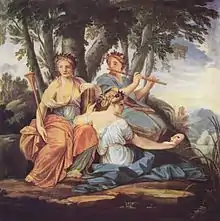Muse
The Muses are goddesses representing different arts and sciences in Greek mythology. They are the daughters of Mnemosyne and Zeus.
- For the British musical group of the same name, see Muse (band).
- Or for the fruit called the Euterpe see Açaí palm.

The Muses Klio, Euterpe and Thalia, by Eustache Le Sueur
Most commonly the Muses are:
- Kalliope (or Calliope), the eldest and wisest, the muse of epic poetry, mother of Orpheus
- Euterpe, the muse of music and lyric poetry. She loved flute playing, and some even say she invented the double flute. Euterpe had a son named Rhesus, who was killed in the battle at Troy, according to Homer's Iliad.
- Klio (also Kleio or Clio), the muse of history
- Erato, the muse of lyric/love poetry
- Melpomene, the muse of tragedy
- Polyhymnia, the muse of sacred poetry (hymn) and geometry
- Terpsichore, the muse of dance
- Thalia, the muse of comedy
- Urania, the muse of astronomy and astrology
The word muse is also sometimes used for a person who inspires somebody else, or any other type of inspiring object. Muse can also be used to describe one's creative thoughts, such as poetry or a musical composition.
Wikimedia Commons has media related to Muses.
This article is issued from Wikipedia. The text is licensed under Creative Commons - Attribution - Sharealike. Additional terms may apply for the media files.